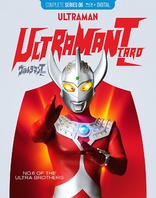Ultraman Taro: The Complete Series Blu-ray Movie
HomeUltraman Taro: The Complete Series Blu-ray Movie 
ウルトラマンタロウ / Blu-ray + Digital CopyMill Creek Entertainment | 1973-1974 | 1351 min | Not rated | Jan 12, 2021
Movie rating
7.7 | / 10 |
Blu-ray rating
| Users | 0.0 | |
| Reviewer | 2.5 | |
| Overall | 2.5 |
Overview
Ultraman Taro: The Complete Series (1973-1974)
Starring: Saburô Shinoda, Eishin Tôno, Toyoyuki Kimura, Shûsuke Tsumura, Kiyoko MatsuyaNarrator: Tetsurô Sagawa
Director: Masanori Kakei, Eizo Yamagiwa, Sei Okamura, Yasuo Yoshino, Kiyosumi Fukazawa
| Foreign | Uncertain |
| Sci-Fi | Uncertain |
| Action | Uncertain |
| Thriller | Uncertain |
Specifications
Video
Video codec: MPEG-4 AVC
Video resolution: 1080p
Aspect ratio: 1.33:1
Original aspect ratio: 1.33:1
Audio
Japanese: DTS-HD Master Audio 2.0
Subtitles
English
Discs
Blu-ray Disc
Six-disc set (6 BDs)
Digital copy
Playback
Region free
Review
Rating summary
| Movie | 4.0 | |
| Video | 3.0 | |
| Audio | 3.0 | |
| Extras | 0.0 | |
| Overall | 2.5 |
Ultraman Taro: The Complete Series Blu-ray Movie Review
Reviewed by Martin Liebman January 12, 2021Note: some of what appears below are summations from the booklet included with this Blu-ray release, written by Keith Aiken.
Special effects wizard Eiji Tsuburaya was at one point best known for his work on some of Japan's most popular Kaiju films -- Toho's Godzilla and Mothra -- but it may be for the Ultra franchise for which he
will ultimately be remembered. In 1963 Tsuburaya founded Tsuburaya Productions, a then small house with the goal of crafting small
screen entertainment with big screen quality. Tsuburaya's first production, Ultra Q, was a monster success (in more ways than one). A follow-up
was quickly ordered. That follow-up: Ultraman, another massive hit for Tsuburaya and the first of numerous
television and cinema Ultra
Q spin-offs that have since gained the franchise recognition in the Guinness Book of World Records for its sprawling longevity.
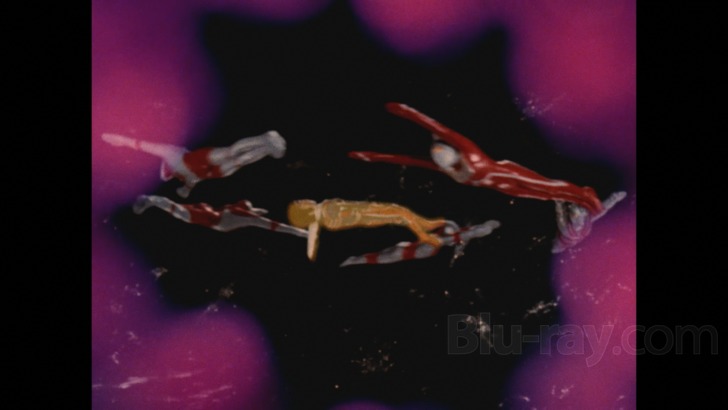
Ultraman was followed by Ultraseven, a show that Tsuburaya envisioned as the close for the Ultra series. But even as new programming was not airing on television, demand for Ultra content continued to rise. Merchandise moved freely from store shelves and Tsuburaya began work on the franchise's fourth installment, The Return of Ultraman, which featured a brand new Ultraman -- better for sales -- rather than making a sequel to Ultraman. Money is king, of course, and more money means more innovation. But production was upset when Eiji Tsuburaya passed in 1970, more than a year before Return's debut on TBS on April 2, 1971. The 51 episode series ran for a year to, again, extraordinarily high ratings. And so the cycle would continue when, even as Return was on the airwaves, Tsuburaya Productions was hard at work developing what would become Ultraman Ace, airing between April 8, 1972-March 31 1973, and Ultraman Taro, premiering on TBS just a week later on April 7, 1973. The franchise had officially become a factory.
Ultraman Taro returns to a more familiar place away from the comparatively complex narratives behind Ace and favors more approachable (and marketable) story drivers and aesthetics (even if the core production design essentials remain firmly intact). Yet the show builds Taro's familial connections in a way not previously explored in the series, and it is here, away from the action, where this iteration finds its footing and place in franchise history. In 1973 the franchise was not so sprawling as it is today, so the connective tissues were easier to build, explore, and ultimately maintain. But the series marks a crucial juncture for the Ultraman universe in its more thorough, and compelling (if not simplistic), detailing of how these characters connect, not just where they come from.
The changes from Ace to Taro are apparent but don't necessarily redefine the show at its core. Taro maintains the same familiar aesthetic and plot structure for practically every episode. Certainly some things have changed or reverted but at its essence Taro is any other Ultraman show, introducing new monsters, returning a few favorites, and building each episode to an exacting layout specification to the point that if there were a mold for a TV show it would be for Ultraman. There's comfort in the familiarity, here with just enough tweaks to earn this iteration its own superficial identity. The series remains a blast even in its repetitiveness. The human drama and individual episode story arcs always play out the same way and towards the same style finale, but Taro does the Ultraman formula proud in one of the most accessible, and now legendary, markers in the franchise's history.
Ultraman Taro: The Complete Series Blu-ray Movie, Video Quality 
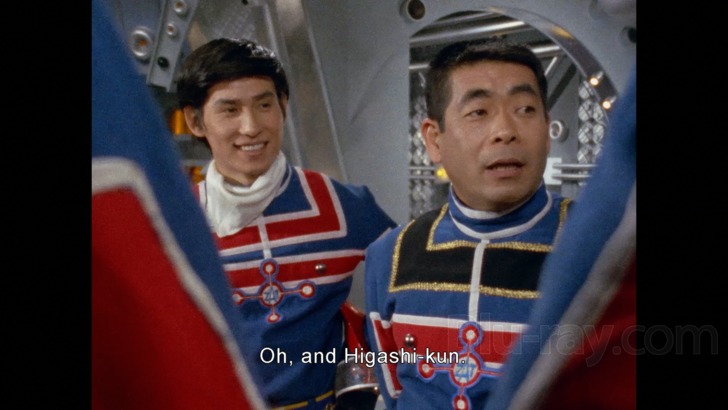
This Blu-ray presents the series in its native 1.33:1 aspect ratio, placing vertical "black bars" on either side of the modern 1.78:1 HD display. The aged film-sourced picture looks fine in the aggregate and certainly well above whatever it looked like on broadcast television on the monitors of the day, but it does demonstrate a lack of source command and clearly wants for a tighter, firmer, more naturally filmic and flowing Blu-ray presentation. Mill Creek's 1080p picture does struggle with macroblocking compression artifacts which can border on severe at times (look at the opening minutes of episode one for an immediate example, and such irregularities do largely follow for the duration). The background is quite sloppy, struggling to hold together, but on the flip side the picture retains a semblance of its natural grain structure – inconsistent and snowy as it may be – and holds to a level of reliably steady midlevel detail. The picture can't find tack sharpness – faces, for example, lack intimate revealing detail – but core elements on monsters, miniatures, Ultra costumes, and real-world environmental supports are adequately sharp. The picture has its moments of tighter texturing and one might be mistaken to believe it to be better than it is at-a-glance but the core issues remain in evidence throughout the series run. Colors fall somewhere between lackluster and lively; there's certainly no sense of severe fading at work, but neither do the otherwise would-be intensive reds and blues, for example, really stand out. That "tweener" state really describes the entire thing. Even as the image doesn't approach Like Father Like Son levels of awful, there's no missing the innate shortcomings and lamenting the missed opportunity for a more filmic, robust picture, the roots of which are in plain evidence in practically every shot.
Ultraman Taro: The Complete Series Blu-ray Movie, Audio Quality 
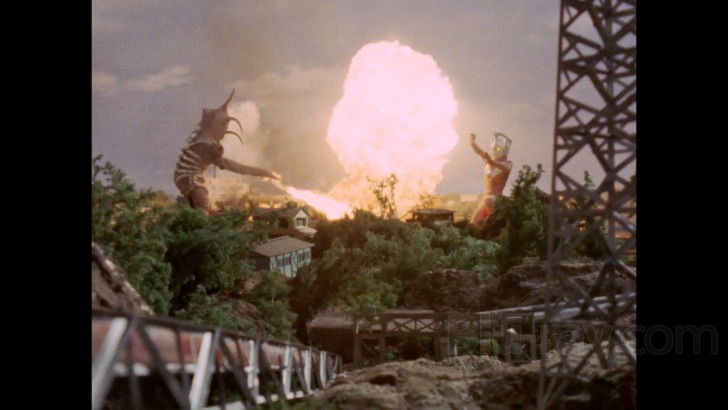
The series is presented with its native Japanese language track in the DTS-HD Master Audio 2.0 lossless configuration. There are no other audio dubs. Optional English subtitles default to "on." The track is unkempt and lacking authentic clarity, but it is wide and aggressive which is often enough to yield a generally satisfying listen, particularly given the inherent sonic constraints. There was little Mill Creek could do to spruce up the track without sacrificing integrity, but even with some of the faults there's an authentic charm to the presentation that helps assuage the sonic senses a bit. When the kaiju attacks midway through episode one, the sounds of destruction struggle to deliver anything resembling tight, well defined detail. Support music during this, and other, battles is crunchy, too, but the net effect is positive enough. The shortcomings are most apparent in the most intensive scenes where battle and score merge into a messy din that delivers crudely identifiable, not tightly defined, sounds. Lesser ambience is worked in well enough along the front. Dialogue is adequately clear and images well enough to the center.
Ultraman Taro: The Complete Series Blu-ray Movie, Special Features and Extras 
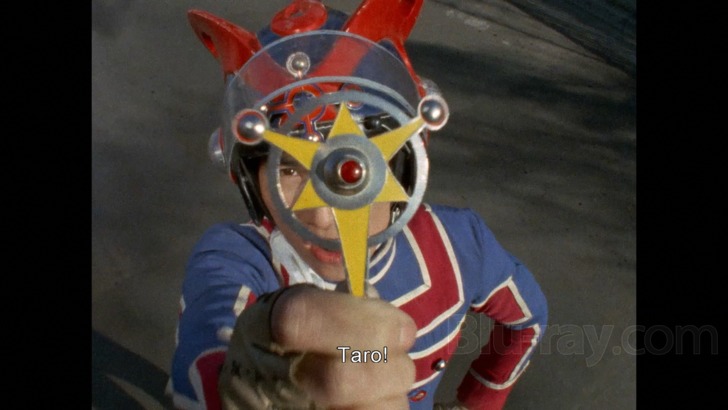
Ultraman Taro contains no supplements across any of the six discs. The main menu screens on each disc only offer the opportunity to toggle subtitles on and off in addition to selecting any of the disc's episodes, which are vertically oriented. The set does ship with an impressively assembled booklet that includes glossy pages, numerous color photographs, and plenty of text. It begins with introductory commentary on the show's history and production and follows with character breakdowns, detailed episode synopses, key monster explorations, and character and technology guides. Mill Creek has put together a comprehensive series breakdown in a relatively small space. While it's disappointing that there are no video-based extras, this compact handbook is a treasure for veterans and a necessity for newcomers just getting their feet wet in the universe.
Ultraman Taro: The Complete Series Blu-ray Movie, Overall Score and Recommendation 
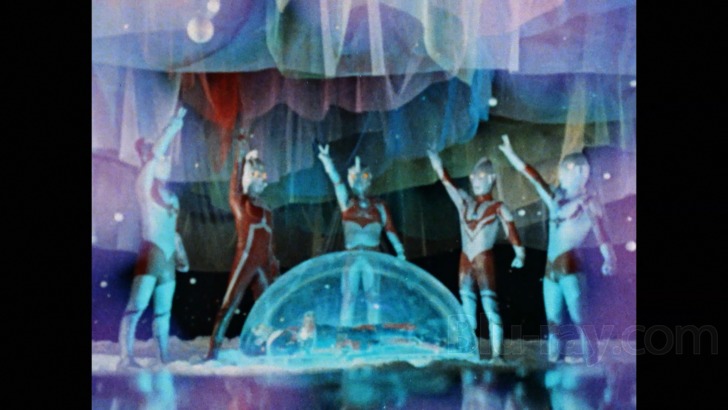
Ultraman Taro's legacy lives on today as one of the standout series and one of the great influencers of the franchise's history to come. It's a solid entertainer, familiar in most every way but adhering to formula like a favorite pair of broken-in shoes. Mill Creek's featureless six-disc collection is flawed but delivers capable video and audio. The booklet is a fine companion, as always, and there's a handsome SteelBook packaging variant which matches previous releases. Recommended.
Similar titles
Similar titles you might also like

Ultraman Ace
ウルトラマンA(エース) / Urutoraman Ēsu
1972-1973

Ultraman Leo: The Complete Series
1974-1975

Return of Ultraman
帰ってきたウルトラマン / Kaettekita Urutoraman
1971-1972

Ultraseven: The Complete Series
ウルトラセブン
1967-1968

Ultraman: The Complete Series
ウルトラマン
1966-1967

Ultra Q: The Complete Series
ウルトラQ
1966

Ultraman X: The Series
2015

Ultraman R/B
2018

Ultraman Zero: The Revenge of Belial
2010

Ultraman Saga
Urutoraman sâga
2012

Ultraman Orb: The Origin Saga
includes Ultra Fight Orb
2016-2017

Ultraman Geed
Series + Movie / ウルトラマンジード / Urutoraman Jîdo
2017-2018

Ultraman R/B: The Movie - Select! The Crystal of Bond
2019

Ultraman Orb
Series + Movie / ウルトラマンオーブ & 劇場版 ウルトラマンオーブ 絆の力、おかりします!
2016-2017

Ultra Galaxy Legend Side Story: Ultraman Zero vs. Darklops Zero
Ultra Galaxy Legend Gaiden: Ultraman Zero vs. Darklops Zero
2010

Ultraman Ginga/Ultraman Ginga S Series + Movie/Ultra Fight Victory
Ultraman Ginga ウルトラマンギンガ, Urutoraman Ginga / Ultraman Ginga S ウルトラマンギンガS, Urutoraman Ginga Esu / Ultraman Ginga S The Movie: Showdown! The 10 Ultra Warriors! 劇場版 ウルトラマンギンガS 決戦! ウルトラ10勇士!!, Gekijōban Urutoraman Ginga Esu Kessen! Urutora Jū Yūshi!! / Ultra Fight Victory ウルトラファイトビクトリー, Urutora Faito Bikutorī
2013-2015

Ultra Galaxy Mega Monster Battle: Never Ending Odyssey
2008-2009

Mega Monster Battle: Ultra Galaxy Legends - The Movie
Daikaijû Batoru: Urutora Ginga Densetsu
2009

Ultraman Zero Side Story: Killer the Beatstar
Ultraman Zero Gaiden: Killer the Beatstar
2011

Godzilla Raids Again
ゴジラの逆襲 / Gojira no gyakushû
1955
